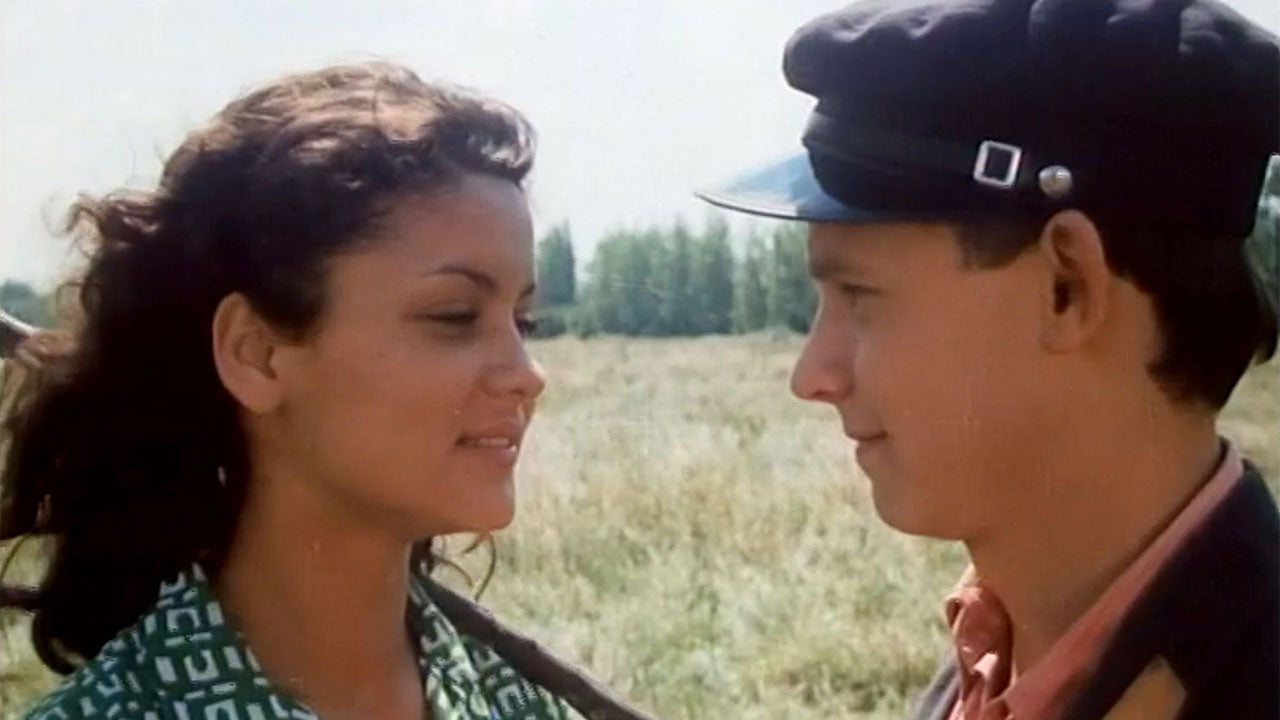In 1976, Slovak cinema was graced with a unique and poetic film titled Rose Tinted Dreams (Ružové sny), directed by Dušan Hanák, one of Slovakia's most distinguished filmmakers. Known for his distinctive visual style and a steadfast commitment to artistic integrity, Hanák crafted a narrative that serves both as a microcosm of societal norms and a timeless tale of forbidden love, echoing Shakespeare's Romeo and Juliet.
Set against the backdrop of a small Slovak village during the 1970s, the film tells the story of Jakub, a young postman portrayed by Juraj Nvota, and Jolana, a beautiful Romani girl played by Iva Bittová. Their unfolding love story is set in a tightly-knit community where Jakub is an integral part of every family's life, whereas Jolana lives on the margins in a Romani colony, surrounded by her extensive family and their daily challenges.
Rose Tinted Dreams masterfully oscillates between reality and dreamlike sequences, offering a narrative space where societal barriers seem momentarily lifted. This technique not only allows the audience to see beyond the confines of the characters' immediate realities but also enhances the romantic elements of the story with a poetic grace. The film's cinematography, handled by Dodo Šimončič, captures the essence of rural Slovak life with a documentary-like fidelity, enriched by moments of lyrical beauty that highlight the everyday poetry of the characters' lives.
The performances of Nvota and Bittová bring an authentic and compelling depth to their roles as young lovers. Their portrayal conveys not just the innocence and hope of first love but also the societal pressures that constrain their romance. The emotional landscape of the film is further elevated by Petr Hapka's evocative music, which intertwines seamlessly with the narrative, enhancing its atmospheric depth.
Beyond its romantic plot, Rose Tinted Dreams offers insightful commentary on the societal divisions and prejudices of the time. The contrast between the village and the Romani colony provides a powerful lens through which the film explores themes of social exclusion, integration, and the transformative power of empathy and understanding. It challenges the audience to reflect on the destructive nature of prejudice and the potential for love to transcend entrenched social boundaries.
Today, Rose Tinted Dreams remains remarkably relevant, addressing themes of societal division and prejudice that continue to resonate in many cultures. The film is a poignant reminder of the power of love and understanding to initiate change. Hanák's film is not only a significant work of Slovak cinema but also a universal exploration of the challenges of human connection in the face of societal norms.
In essence, Rose Tinted Dreams is more than just a film; it's a poetic exploration of love, society, and the possibilities of human connection. Its enduring appeal lies in its ability to blend realism with a poetic vision, making it a timeless piece that continues to inspire and resonate with audiences around the world.
🌍 We love getting to know our customers from all around the world. Share your memories, tell us what you think about the article or movie, and let us know if there’s anything you’re missing on our site. We’re excited to hear from you!
Recent posts

Kings, conspiracies, and comedy with no brakes: You Are a Widow, Sir on remastered Blu-ray
Some comedies make you smile. Others give you no time to breathe – once they take off, they race straight into pure a...
Read more

Franz: Kafka as a dream you can’t explain - only experience
For years, it felt like a film about Franz Kafka would either become a dry biography or an inaccessible riddle. Kafka...
Read more

A Czech Valentine’s Special: love with wit, charm, and a little truth
Valentine’s Day doesn’t have to be all roses and sugary clichés. Sometimes all you need is a good film, a blanket, so...
Read more

Farewell to the “Czech Bardot”: Jana Brejchová (1940–2026)
Sad news for Czech cinema lovers. Actress Jana Brejchová passed away on Friday, February 6, 2026, aged 86. The news w...
Read more

When Your Home Can Hear You: The Ear on Restored Blu-ray
Some films are not made for comfort. They are made to stay with you. The Ear / Ucho is one of those rare Czech classi...
Read more

A Night at Karlstein Returns in a Digitally Restored Blu-ray Edition
Some films are more than classics. They become traditions. A Night at Karlstein / Noc na Karlstejne is exactly that ...
Read more

🎬 I Enjoy the World with You Returns on Remastered Blu-ray
Few Czech films are as deeply rooted in family tradition as I Enjoy the World with You / S tebou me bavi svet. This b...
Read more

Important notice for customers outside Europe – shipping update effective January 1, 2026
We would like to inform our customers outside Europe about an upcoming shipping change.As of January 1, 2026, Czech P...
Read more

Baron Munchausen Returns - A Digitally Restored Masterpiece by Karel Zeman
Another timeless gem from the legendary imagination of Karel Zeman is now available on DVD in a digitally restored ed...
Read more

Christmas Time at Czechmovie - Shipping information and a heartfelt thank you
Christmas is fast approaching, bringing with it a time of calm, slowing down, and moments spent with our loved ones. ...
Read more







